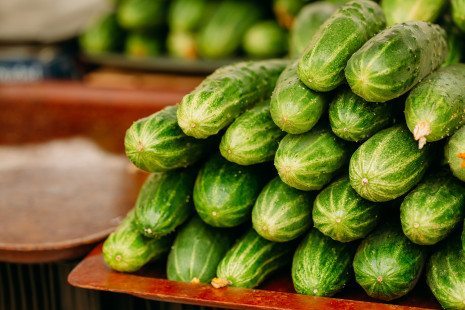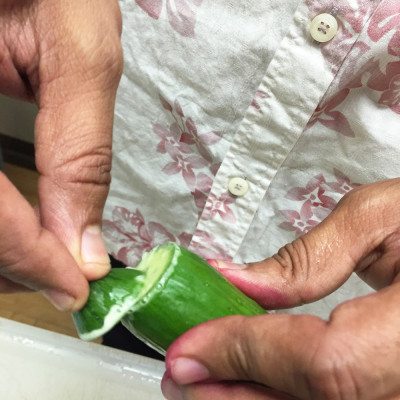We love cucumbers as a crisp, refreshing addition to our salads, or to add a bright, yummy twist in our water… but how much do we REALLY know about this unassuming fruit?
That’s right, I said fruit! Actually a cousin of the watermelon, the cucumber is considered a fruit because it is the part of a flowering plant that contains the seeds.
This same botanical principle can be applied to everything from tomatoes and squashes to apples and pomegranates, to take some of the mystery out of the whole fruit vs. vegetable controversy (of course, whatever technical classification you group these foods into, all these natural plant foods are incredibly healthy!).
Cucumbers are a powerhouse of nutrition, so the more you can work them into your diet, the better.
With multiple B vitamins and zero saturated fats or cholesterol, cucumbers are certainly a very skin and hair-nourishing, hydrating and heart-healthy choice for a crunchy, delicious snack, but that is not all. Cucumbers are also a fairly good source of vitamin K, so they support your healthy bones, lowering the risk of osteoporosis, and their anti-inflammatory properties support brain and joint health.
In my first trimester, I craved and ate cucumber salad almost daily. Something about it was incredibly appealing to me- perhaps the crunchy freshness of the cucumber slices as the perfect carrier to the sour apple cider vinegar I tossed them with.
The antioxidants in cucumbers work to lower your risk of certain cancers and other chronic diseases, while the natural dietary fiber they provide supports good digestion and colon health.
Surprisingly, cucumbers don’t keep very well in the refrigerator, as they tend to develop pits on the outside and go a bit watery on the inside if stored under 50° for more than about 3 days, so simply keep them in a cool, dry place.
They also tend to be sensitive to the ethylene gas given off by other fruits during the ripening process, so give them their own special spot away from your apples, bananas and avocados.
While cucumbers usually add a blast of freshness, sometime they can tend toward bitterness which can really spoil your salad or snacking experience. This is due to curcurbitacin, an organic compound found in the skin. Usually found in the leaves, roots and stems, it can sometimes spread to the fruit itself.
The best way to be sure that your dish doesn’t have any traces of bitterness is to simply cut approximately ¼” from each end of your cucumber and then just rub the slice over the exposed ends for a few minutes. Some white foam will be produced, which you can and should wash off.
I spoke about this tip last week a little when I shared with you My Winter Dandelion Greens Salad, see the picture below. :)
You will observe a foamy substance beginning to form there which actually contains the curcurbitacin that is causing the bitter taste. Keep on going until it stops producing that white foam, and then just give it a quick rinse before serving.
All my very best,
Kimberly




This is so interesting! I can’t wait to try it:))!-
Aubrey
My grandmother always used to do that and now I do the same thing! I’ve never looked into the reasoning before.. she just told me it removes the bitterness. This was so interesting!